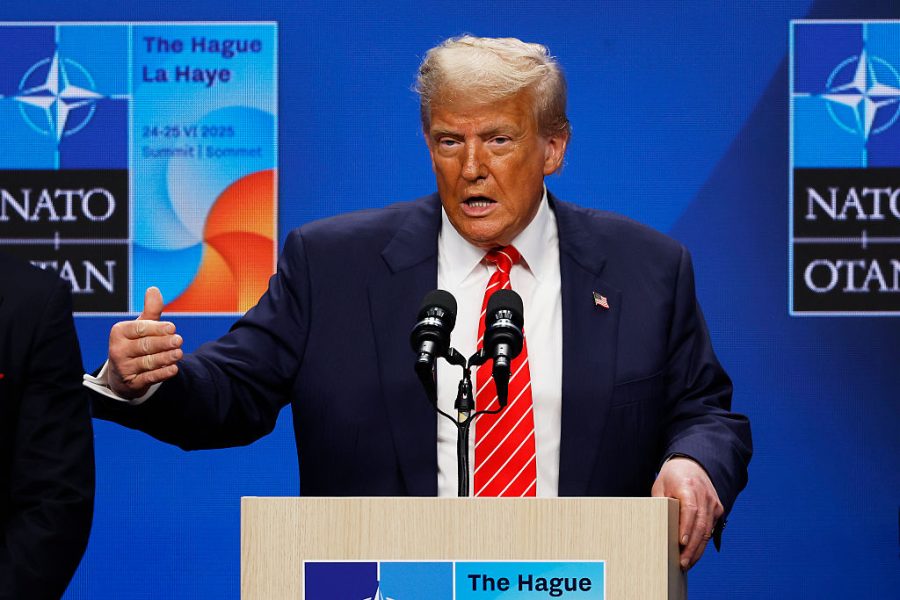For the moment, at least, the world seems to be going Donald Trump’s way. Instead of setting the Middle East ablaze, Trump’s air strikes on Iran’s nuclear facilities have been met by a single, casualty-free Iranian counterstrike on the US’s al-Udeid Air Base in Qatar. And though Tehran described the attack as ‘mighty and successful’, it emerged that Iran had actually warned the Qatar authorities in advance of the strikes – a message that they immediately passed on to the Americans.
At the Nato summit in the Hague this week, European leaders lined up to support Trump’s demand that they ‘pay their way’ and boost their defence spending to 5 per cent of GDP. European Commission President Ursula von der Leyen hailed the new defence bonanza as an opportunity to boost European innovation and announced a ‘Rearm Europe’ plan to mobilise €650 billion (£554 million) in defence investment. Every Nato member state (except for Spain) signed up to the new 5 per cent target – even though for most members that figure entails doubling, or in some cases tripling, defence budgets.
Trump came to office promising to be a peacemaking president
Nato’s secretary-general Mark Rutte even sent Trump an effusive note praising his strikes on Iran. ‘Mr President, dear Donald, Congratulations and thank you for your decisive action in Iran, that was truly extraordinary, and something no one else dared to do,’ gushed Rutte in language apparently intended to mirror Trump’s own bombastic tweeting style. ‘Donald, you have driven us to a really, really important moment for America and Europe, and the world,’ continued Rutte.
It was not easy but we’ve got them all signed onto 5 per cent! You will achieve something NO American president in decades could get done. Europe is going to pay in a BIG way, as they should, and it will be your win.
It was a very different reaction to the last time Trump addressed a Nato summit in London back in 2019. Then, a hot-mike moment caught Canadian prime minister Justin Trudeau, British premier Boris Johnson, French President Emmanuel Macron and – yes – Mark Rutte, then-Dutch prime minister sniggering over Trump’s lateness. Trump was so incensed by the mockery that he flew home early, but not before blasting Trudeau as being ‘two faced’ and criticising him for failing to meet Nato’s spending benchmark – then a mere 2 per cent of GDP.
Remarkably, Trump’s order to both Israel and Iran to cease fire after twelve days of massive bombardments seems to be holding. More impressive still is that both sides immediately began to violate the ceasefire but were immediately brought to heel by hard words from the White House.
That leaves just one major fire on Trump’s foreign policy horizon that’s still burning: Ukraine. As he was campaigning for the presidency, Trump vowed that he would stop the conflict ‘within 24 hours’. In practice, three months of intensive negotiations both by Trump envoys and by phone direct with Putin have yielded nothing but weasel words from the Kremlin. At the same time, the White House’s relationship with the Ukrainians reached rock bottom after Volodymyr Zelensky’s train wreck meeting with Trump and Vice President J.D. Vance in the Oval Office in February was followed by a freeze on US arms and funding to Kyiv.
But the Nato summit seemed to yield some positive news for Ukraine, too. Trump was photographed, beaming, beside Macron and Zelensky – whom he described as ‘a nice guy’. When a Ukrainian reporter asked Trump about the US providing air defence systems, the President asked her about where her husband was – and on learning that he was a soldier, he said, ‘I wish you a lot of luck, I can see it’s very upsetting to you.’ He also promised to send ‘some’ Patriots to Kyiv, noting that the US needed them and so did Israel.
But most significantly, Trump blocked Putin’s attempt to pivot away from Ukraine by publicly squashing the Kremlin’s offers to mediate between Washington and Iran. ‘I’ve spoken to Putin. I said no, I don’t need help on Iran,” Trump told reporters. “Do me a favour, help with Russia.’
Trump’s hard words for Putin were a welcome sign to Ukrainians that the White House does retain some scepticism about Putin’s hollow claims to be serious about peace. At the same time, though, Trump’s team made it clear that they saw talks, not military aid, as the only solution to the conflict. ‘@POTUS has been abundantly clear the Russia-Ukraine war must end,’ tweeted Secretary of State Marco Rubio. ‘There is no military solution, only a diplomatic one.’ But there were hopeful words for the Kremlin too. Rubio added that the US would not be imposing additional sanctions against Russia because if ‘we come in and crush them with more sanctions, we probably lose our ability to talk to them about the ceasefire and then who’s talking to them?’
In the space of a few days, Trump went from bombing Iran to being bombed to a ceasefire, allowing all sides to claim victory. Trump also succeeded in not only persuading recalcitrant Europeans to massively increase their defence spending but also in making them enthusiastic about doing it. Vice President Vance also articulated what he called the ‘brutally simple’ Trump Doctrine:
Define a clear American interest. Push hard through diplomacy. If that fails, strike fast, win quick, and get out – before it becomes another endless war.
Trump came to office promising to be a peacemaking president. After three months in office, he’s fought his first short, victorious war. But it will be achieving a lasting peace in Ukraine – and wrangling the notoriously stubborn and duplicitous Putin into a deal – that will be the Trump’s true foreign policy test.
This article was originally published in The Spectator’s world edition.








Comments